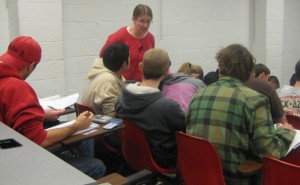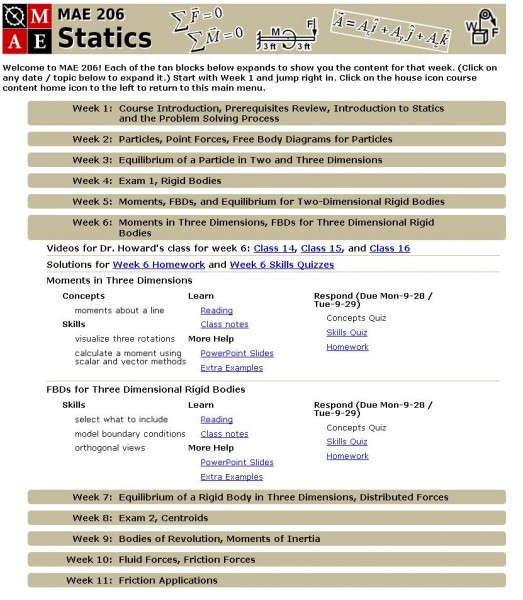Engineering a Dynamic Statics Course
When students walk into an engineering course, they expect long lectures and complicated explanations. However, when students enter the 2009 experimental offering of MAE 206: Engineering Statics, they become something more than passive learners: they become managers, reporters, or skeptics.
Students are transformed because of Dr. Anna Howard, teaching associate professor of Mechanical and Aerospace Engineering at N.C. State University. For her work on Engineering Statics, Howard won the Gertrude Cox Award for Innovative Excellence in Teaching & Learning with Technology in 2010.
Howard received a DELTA Large Course Redesign (LCR) Pilot Grant in spring 2008 for redesigning Engineering Statics to improve understanding and retention in a course where 25 percent of 600 students annually drop, withdraw, or fail (DWF).
Howard worked primarily with DELTA Assistant Director for Instructional Development Dr. Traci Temple, and Web Accessibility, Usability and Design Specialist Lisa Fiedor assisted Howard with Vista.
According to Howard, the main redesign goal was to “find ways to convert the time students spend to more effective learning methods because time crunch is such a problem. How can I actually get these concepts across as efficiently as I can and at a time when students need it? How can I get them the help when they need it, not just when they’re in class?”
Students teaching students
With assistance from DELTA, Howard found a variety of solutions. These approaches culminated in the spring 2010 pilot section of Engineering Statics, where Howard adopted the SCALE-UP (Student-Centered Active Learning Environment for Undergraduate Programs) approach, while continuing to teach traditional lecture sections.
For pilot students, all lectures and notes are online, while class is spent working in teams of three to solve statics problems, taking on roles as managers, reporters, and skeptics.

The manager’s job is to keep things moving, to make the big picture decisions. The recorder does all the writing for the team. The skeptic’s job is to make sure that somebody is double-checking: ‘Is this what we really need to be doing?’, according to Zack Capets, a learning assistant and junior in Aerospace Engineering.
To assist teams with problem solving, Howard hires previous students who received a “B+” or better in the course to serve as learning assistants during class. Outside of class, teaching assistants hold office hours for students who need additional help, according to R.J. Turner, a learning assistant and junior in Engineering.
Students are enjoying the change of pace.
“It’s helpful, I like it. It’s different in a refreshing sense than my other engineering courses because it’s not an hour-long lecture,” one student said.
Dynamic Online Environment
In addition to teaching face-to-face sections, Howard also teaches Distance Education sections through Engineering Online to students at N.C. State, UNC Asheville, UNC Wilmington, Craven Community College, Lenoir Community College, and even more students in the future.
To reach all these students, Howard uses Mediasite to stream and capture live lectures. The recordings are available to students after class and provide students with another way to review concepts and see how problems are solved.
Howard also implemented Livescribe, which captures and synchronizes Howard’s pen strokes and words as she solves problems from class as well as additional examples. Students know that the examples are online and can focus during class time on understanding rather than copying furiously, according to Temple.
“Anna was really the first faculty member that we know of to start using Livescribe. She then demoed it to the MA 111 faculty who are doing redesign and they have now adopted Livescribe for their course,” Temple said.
Faculty teaching Mathematics of Finance (MA 105), Precalculus I (MA 107), and Quantitative Analysis (CH 315) have since also implemented Livescribe.
To aid students studying for exams, Howard uses a WolfWiki. The wiki content is entirely student generated, which encourages student-to-student teaching and provides space for students to reiterate the principles presented in class and in the Livescribe videos, according to Temple.
Howard hosts all of this course content online in Vista. Message boards, reviews, PowerPoint slides, prerequisite trigonometry reviews, quizzes, and exams are also available in Vista.

Howard also uses clicker quizzes each day, which allow students from all over the state to enter a response electronically on a remote control clicker and then view feedback instantly as Howard displays the results in graphs.
Using data from the traditional and pilot sections, Howard found that the clicker quizzes have increased student attendance.
Other tests Howard has conducted show that online exams predict the future performance of students in higher-level classes and that clicker feedback is important to students.
Because of Howard’s vast innovative work both inside and outside the classroom, anonymous judges selected Howard for the 2009-2010 Gertrude Cox Award. The judges wrote of Howard’s achievement:
“Using the teaching methods and tools she has assembled has resulted in a 10% decrease in students with grades of ‘D’ and ‘F’ over the previous year’s measures. Dr. Howard’s achievement in her course provides models for the revamping of large class instruction in a manner that utilizes multimedia tools appropriate to the subject.”
Howard received the Gertrude Cox award for this very reason: her blended course is an innovative and refreshing model for large course redesign. No longer are students confined to the classroom, but can achieve clarity in Engineering Statics in a dynamic in-class and online environment.
Read more information about the four Gertrude Cox Award winners.
- Categories:


